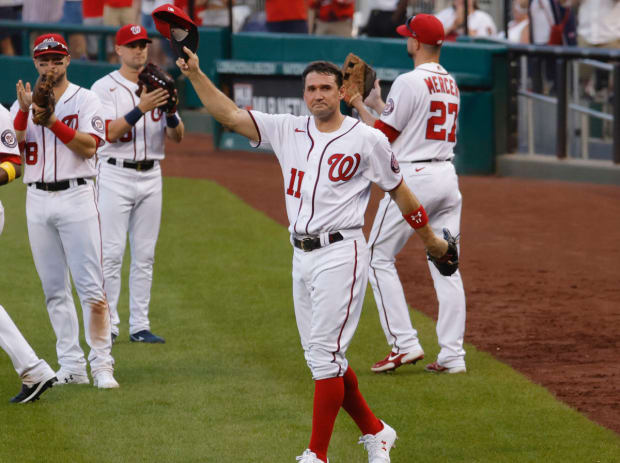There are hundreds of baseball players who have served as the face of a franchise. A team always has to have one, even if that face is nontraditional, a rookie or a midseason acquisition or a fifth starter, that says as much about the state of the club as anything else possibly could. The face of the franchise does not have to be of the franchise so much as he simply has to be in it—which separates those from the players who have defined a franchise. These serve as not so much its face as its soul. Their public identity becomes inextricable from the club, and vice versa: Mr. Cub. The Captain. Mr. Tiger.
The basis of this relationship is usually greatness, but there is something else in it, too—a glorious alignment of fortune and timing and finances that lets a roster spot last for a generation. There are only a few dozen of these scattered across a century and a half of history, and just 60 players to ever spend a career of more than 15 years with just one club.
And there is one player whose relationship with his team has been altogether more enchanting than any of the above. He was the face of the franchise, yes, and its name became his own, but he did something more: He and the franchise grew up alongside one another.
Ryan Zimmerman was the first draft pick of the Washington Nationals, selected in the first season of the club’s existence (2005) after their move from Montreal, when he was a 20-year-old out of the University of Virginia. He made his debut in the majors later that year. Now, a decade and a half later and then some, he’s announced his retirement. It feels almost silly to call it the end of an era for Washington: too obvious a fact to be worth remarking on. But it’s true, and it’s the result of a one-of-a-kind career.

Geoff Burke/USA Today Sports
“First draft pick in team history” is usually the basis of a trivia question. For Zimmerman and the Nationals, it ended up feeling like a mission statement. Zimmerman was the first player the Nationals chose for themselves, and he chose them back, again and again. He was there when the team played its first few seasons in old RFK Stadium. He was there when they moved to a place of their own in Nationals Park—with a walk-off home run to christen the field. He was there when the team lost 102 games in 2008 and again when it lost 103 in 2009. (The latter season, at least, included Zimmerman winning the team’s first Gold Glove.) He was there to welcome Bryce Harper and Stephen Strasburg and Max Scherzer. He was there to see the Nationals make the playoffs for the first time, and he was there to see first-round futility become a pattern, then a punchline. He was there when the joke stopped being funny, and he was there, finally, when the Nationals had the last laugh in the World Series. He was there. He always was.
That time period saw Zimmerman’s star on the field rise and flicker and dim. Beset by injuries, he eventually had to move off third base, and time later took a bigger toll. For all his talent and team records—many team records, as Washington’s career leader in hits and home runs and games played and RBI—he is most likely not set for the Hall of Fame. (That puts him in a minority among his peers: Of the 60 players who spent a career of more than 15 years with the same organization, 40 are Hall of Famers, and most of the others either are not yet eligible or began their careers before free agency, when player movement was quite different.) Yet the story of what he did with the team is no less engaging for it. The Nationals’ history, to date, has been Zimmerman’s history.
But the hardest part of telling a story is figuring out when to end it. Zimmerman and the Nationals had a storybook beginning with that initial draft pick. The end? Hugging the World Series trophy in 2019 would have been magical—if, perhaps, a bit too on-the-nose. But it wasn’t quite right, and he wasn’t quite ready. Zimmerman signed on for another year; when the pandemic hit while his family was expecting a new baby, he decided to sit out 2020, and so he signed on for another after that. He looked capable in 2021—a part-time first baseman who stayed healthy and hit well above average. At 36, he seemed as if he could keep going in some capacity, perhaps even for a few more years. But the franchise was clearly at a turning point. It sold at the trade deadline, tearing down much of what was left of the championship team from just a few years prior, and there was soon talk of a “new era” and a “reboot.” Zimmerman had been the bridge over every prior iteration of Nationals baseball. Now, it seemed clear, he was finished crossing.
On the last day of the season, Washington skipper Davey Martinez pulled Zimmerman from the game for a curtain call in the eighth inning. The crowd gave him an ovation that felt as if it might never stop. Mr. National didn’t make it official until today, but it felt obvious then, on October 3. He had given all that he could have ever hoped to give. The fans had nothing more to ask of him.







